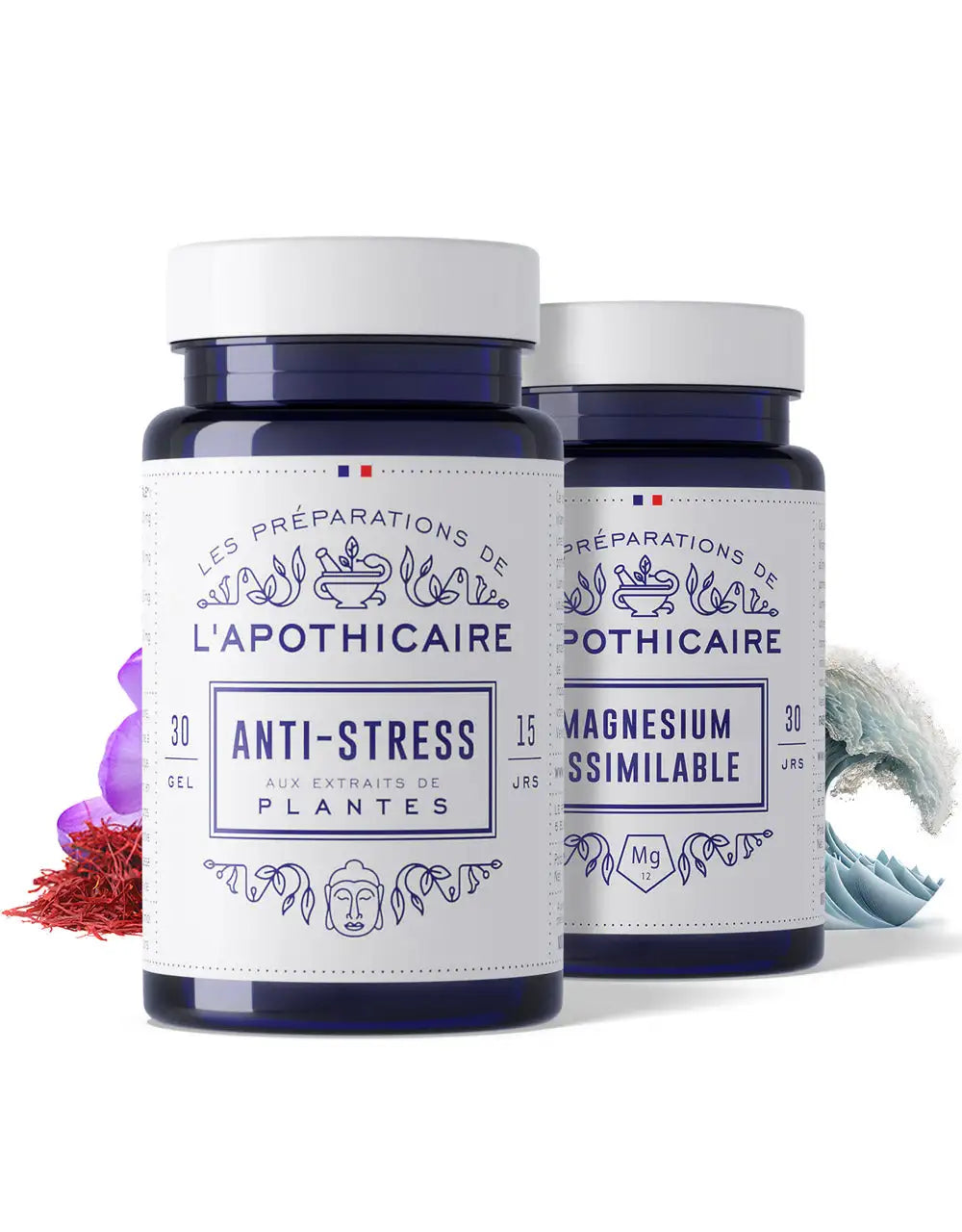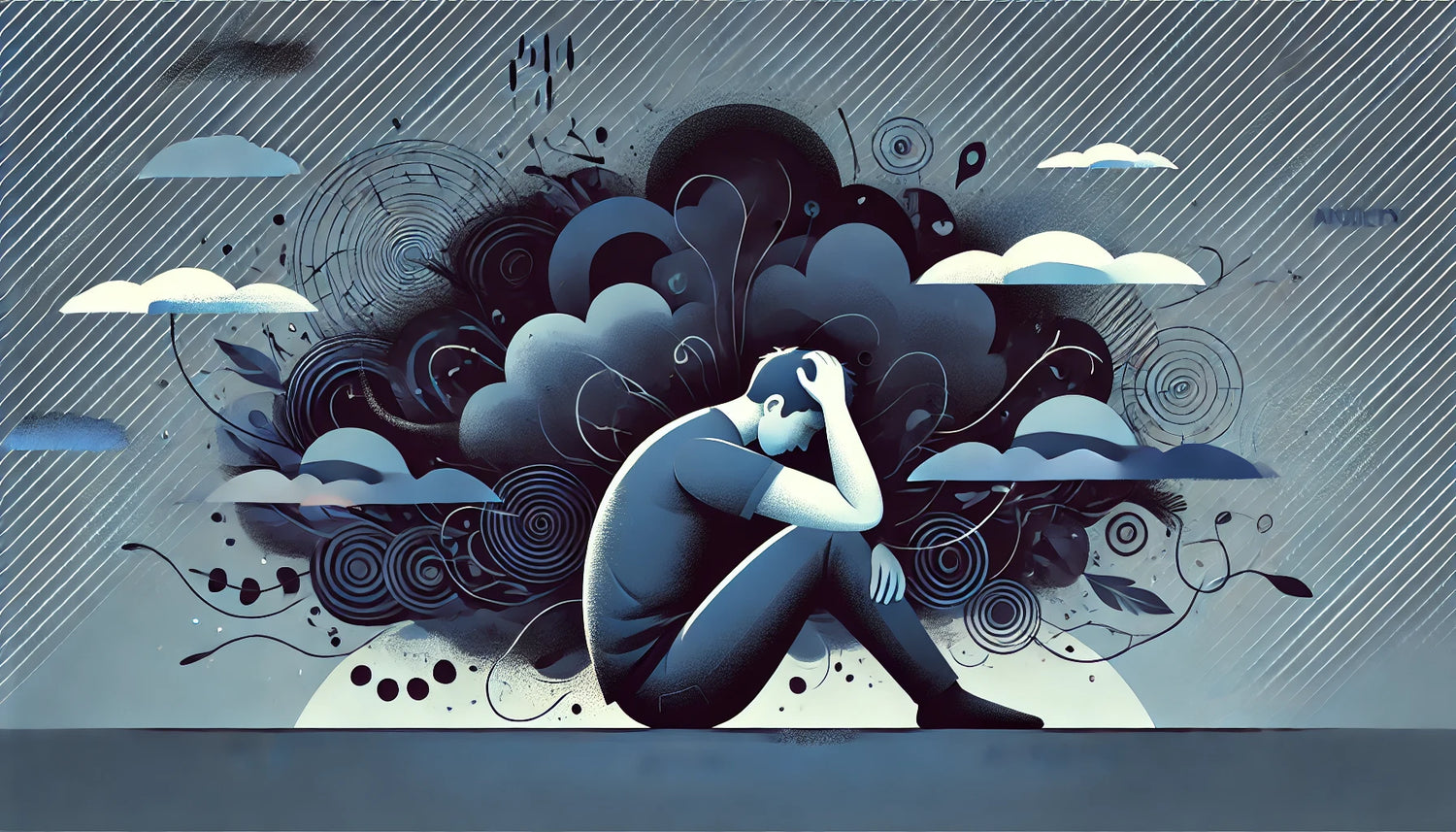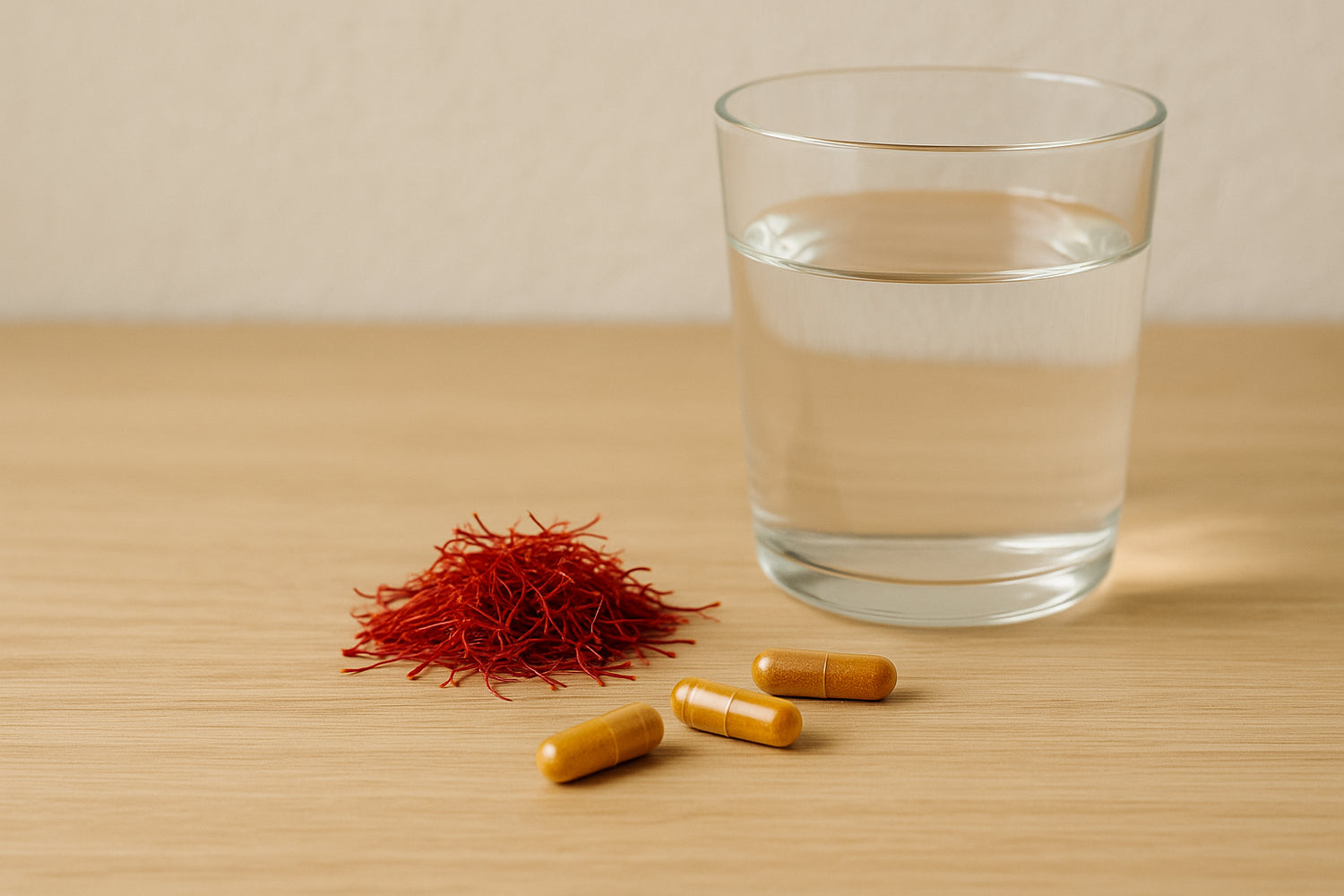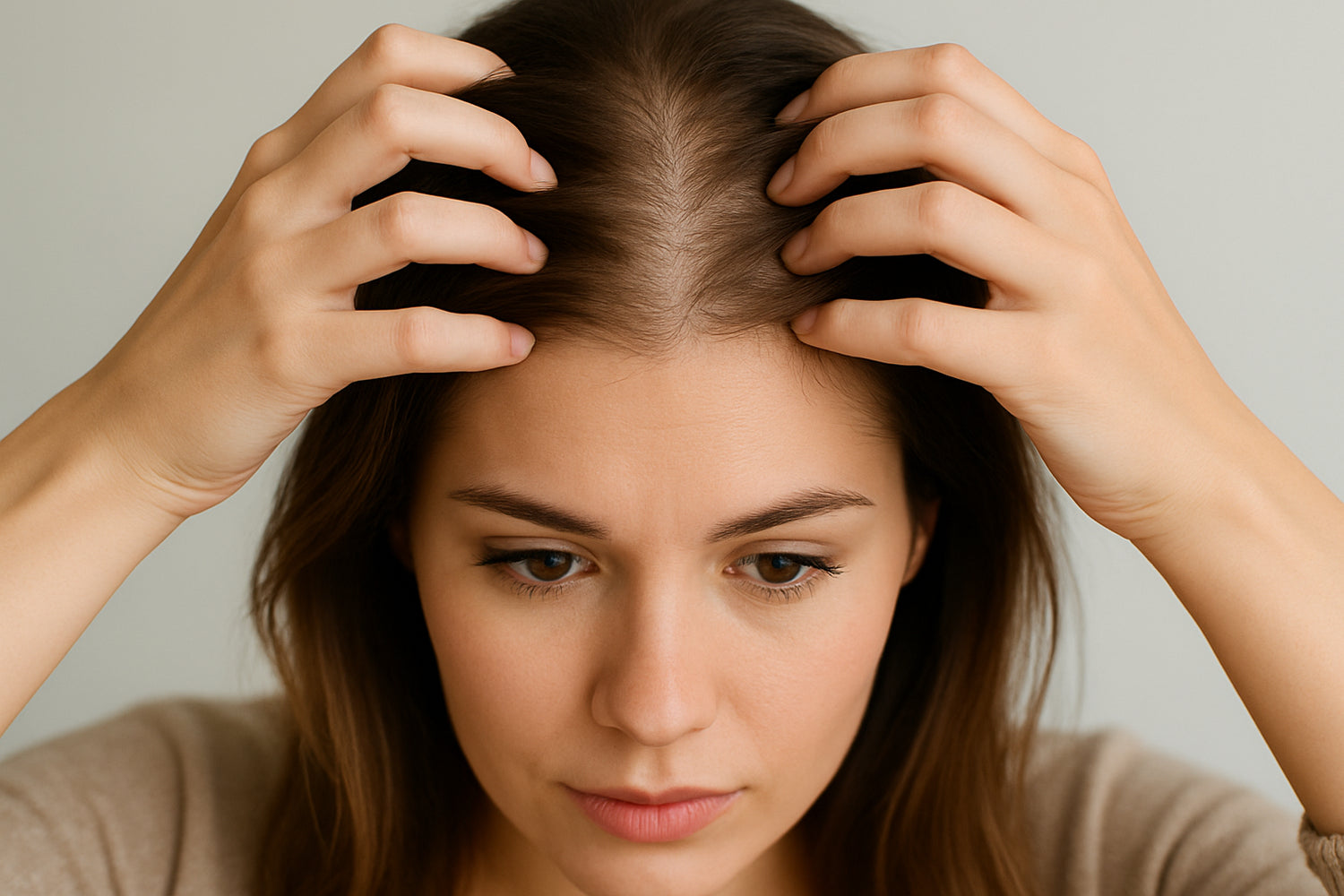Anxiety can disrupt quality of life when it becomes persistent. This article offers 17 natural tips to ease anxiety symptoms without resorting to medication.
Whether you're looking for calming herbs, dietary enhancements, or relaxation techniques, here you'll find simple, accessible solutions to take care of your emotional well-being.
- Anxiety: definition
- Causes of Anxiety
- Forms of anxiety
- Natural Remedies to Treat Anxiety
- When to see a doctor?
Anxiety: definition
What is anxiety?
Anxiety is the body's natural response to situations perceived as stressful or dangerous .
It manifests itself through excessive worry, a feeling of agitation, and physical symptoms such as a racing heart or muscle tension. This reaction can be useful in the short term to cope with threats, but when it becomes persistent, it can harm quality of life .
Who can be affected?
Anyone can be affected by anxiety. It affects people of all ages, from children to adults , and can manifest in different forms, such as generalized anxiety disorder, phobias, or panic attacks.

Causes of Anxiety
From a genetic perspective, a family history of anxiety disorders may increase the likelihood of developing this condition.
Environmental factors, such as a stressful environment or traumatic experiences , also play a key role in triggering it.
On a biological level, chemical imbalances in neurotransmitters , such as serotonin or GABA , disrupt mood regulation.
Additionally, certain physical illnesses, such as thyroid disorders , can cause or worsen anxiety.
In addition, psychological factors, such as past traumatic events or a personality predisposed to worry , can increase vulnerability to anxiety. Perfectionists or highly sensitive people are often at greater risk.

Forms of anxiety
Anxiety manifests itself in different forms, each with specific characteristics:
- Generalized anxiety disorder : constant and excessive worry about various aspects of life (work, health, family), often for no apparent reason.
- Panic disorder : sudden onset of intense panic attacks accompanied by physical symptoms such as palpitations, sweating, or feelings of choking.
- Phobias : excessive and irrational fear of specific objects, situations or activities (e.g. phobia of heights, flying).
- Social anxiety : intense fear of social interactions, fear of judgment or embarrassment.
- Obsessive-compulsive disorder ( OCD ): recurring, intrusive thoughts that cause repetitive behaviors (e.g., frequent checking).
- Post-traumatic stress disorder ( PTSD ): Anxiety caused by past trauma, with flashbacks, nightmares, and hypervigilance.
Each of these forms of anxiety can have a significant impact on quality of life and often requires specific treatment. While OCD and PTSD require the support of a doctor, you can start by trying to treat anxiety naturally with some natural solutions.

Natural Remedies to Treat Anxiety
Bach flowers
Bach flowers are flower essences designed to balance emotions . They are used to soothe negative emotional states such as anxiety and stress. They work by acting on emotional energy, bringing calm and serenity.
Passionflower
Passionflower ( =Passiflora incarnata L. ) is a plant with natural anxiolytic properties. It is often used to calm agitation and improve sleep . It helps reduce symptoms of mild anxiety by promoting a state of calm without excessive drowsiness, in the form of herbal tea or food supplement.
Magnesium
Magnesium plays a key role in stress management. It helps relax muscles and nerves, reducing anxiety-related tension . A magnesium deficiency can make anxiety worse, so it's important to make sure you're getting enough through food (green vegetables, nuts) or supplements.

Apothecary Preparations helps you fight your anxiety!
Discover the combination of soothing plants in the Anti-Stress formula with Assimilable Magnesium to regulate mood, stress and irritability.
See the anti-stress food supplementsValerian
Valerian ( =Valeriana officinalis L. ) is a plant traditionally used to treat anxiety and insomnia . It acts on the nervous system by stimulating GABA receptors , responsible for relaxation and sleep. It is particularly effective for those who suffer from anxiety-related sleep disorders, usually taken in the form of herbal tea or capsules.
Chamomile and green tea
Roman chamomile ( =Chamaemelum nobile (L.) All. ) and green tea ( =Camellia sinensis ) are two plants known for their calming effects. They help reduce anxiety by promoting relaxation and decreasing heart rate . These infusions can be consumed daily to alleviate stress symptoms naturally.
Essential oils
Essential oils, such as true lavender ( = Lavandula angustifolia ) or bitter orange ( = Citrus aurantium ), are known for their calming properties . They can be used in diffusion, massage or in a bath to soothe nervous tension and promote a feeling of relaxation.
Sleep
Quality sleep is crucial for regulating mood and reducing anxiety naturally . Lack of sleep amplifies stress responses, while adequate rest allows the brain to better manage emotions and improve resilience to daily stress.
Food
A balanced diet rich in nutrients like magnesium, B vitamins, and omega-3 fatty acids helps stabilize mood and reduce anxiety. For example, nuts, seeds, and oily fish are beneficial for mental health and the nervous system.
Breakfast
A high-protein breakfast helps stabilize blood sugar levels , which reduces mood swings and anxiety spikes. Eggs, legumes, or Greek yogurt are great choices to start your day off right.
Omega-3 fatty acids
Omega-3 fatty acids found in oily fish, such as salmon and sardines, are known for their benefits for the brain . They reduce inflammation and contribute to the proper functioning of neurotransmitters. This improves mood and reduces anxiety. They can be taken as a supplement if fish consumption is low.
Strengthen the intestinal flora
Gut flora plays a key role in managing anxiety, as the gut is linked to the brain through the gut-brain axis . Maintaining a balanced flora through probiotics, fiber, and a healthy diet can reduce stress and improve mood.
Physical exercise
Regular physical activity is a powerful natural remedy against anxiety. Sport stimulates the production of endorphins, the hormones of well-being, and helps to relieve mental and physical tension . It is recommended to do at least 30 minutes of moderate exercise every day.

Breathing
Deep breathing exercises, such as abdominal breathing , help to quickly calm stress and anxiety. Taking a deep breath in through your nose and then slowly exhaling through your mouth can rebalance the nervous system and calm the mind in just a few minutes.
Meditation
Mindfulness meditation helps calm the mind and reduce anxiety by focusing on the present moment. Practiced regularly, it helps reduce intrusive thoughts and promote a state of inner peace . There are apps to make the practice easier.
The temperature
Warming up, such as taking a warm bath, can help relax muscles and relieve stress naturally . Heat promotes a sense of well-being by calming the nerves and reducing physical tension.
Vitamin D
Vitamin D is essential for mental health. It helps regulate mood and emotional balance . Vitamin D deficiency is often associated with mood disorders, including anxiety. Sun exposure or supplements can help maintain healthy vitamin D levels.
B vitamins
B vitamins, especially B6 , B9 (folate), and B12 are important for the metabolism of neurotransmitters responsible for mood. They help regulate the stress response by keeping the nervous system healthy . A diet rich in vegetables, whole grains, and lean meats contributes to adequate intake.
These 17 tips are practical for treating anxiety naturally. However, sometimes a doctor's help may be necessary.
When to see a doctor?
It is recommended to consult a doctor if stress becomes too overwhelming and significantly disrupts daily life. Here are some signs to watch for:
- Chronic stress : When anxiety persists over a long period of time and affects areas such as work, sleep or social relationships.
- Physical symptoms : frequent headaches, palpitations, muscle pain, digestive problems linked to stress .
- Ineffective coping methods : if the usual techniques (relaxation, sport) are no longer sufficient to relieve stress.
- Risky behaviors : Using alcohol, medication, or isolating behaviors to manage anxiety.
A doctor will be able to assess these symptoms, suggest solutions such as therapies, psychological support or, if necessary, prescribe medical treatment to regulate stress.
Although these natural solutions can help relieve anxiety, it is sometimes necessary to consult a healthcare professional if symptoms persist or become too overwhelming.







